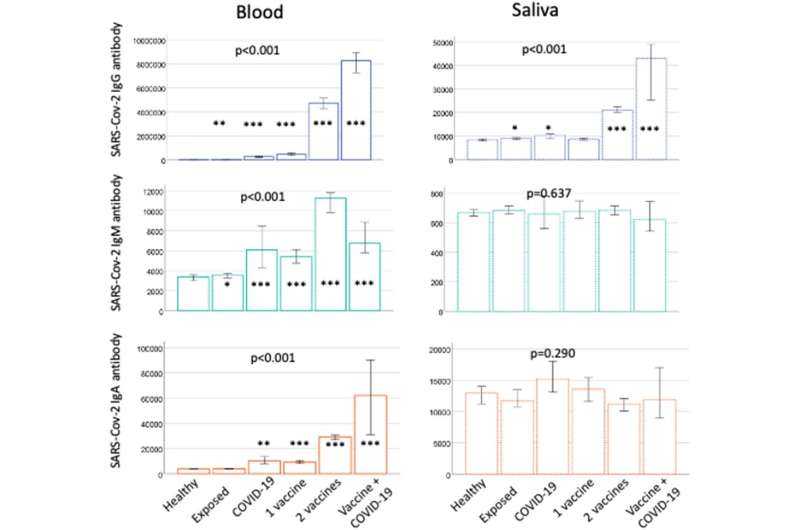Dried samples of saliva and fingertip blood are useful in monitoring responses to coronavirus vaccines


In a study by the University of Helsinki and HUS Helsinki University Hospital, the levels of antibodies associated with the SARS-CoV-2 virus were analyzed in more than 1,200 employees in the social welfare and health care sector to determine whether there were differences in different antibody classes according to viral exposure.
Dried saliva and blood samples collected between January and March 2021 were utilized in the study. The exposure and background data were collected using a questionnaire.
Based on the results, immunoglobulin G (IgG) has a 99.5% sensitivity and 75.3% specificity to distinguish people with two vaccinations from non-exposed and exposed individuals, individuals with previous COVID-19 infection, and those with one vaccination. IgG measured from saliva also had an 85.3% sensitivity and 65.7% specificity in distinguishing people with two vaccinations from the other groups.
The results of the study have been published in the Medical Microbiology and Immunology journal.
Dentists had the lowest amount of antibodies against the virus
The study attested to the exposure of social welfare and health care employees to coronavirus, visible in the results as elevated antibody levels. A total of 47.5% of nurses and 47.7% of doctors were seropositive due to either a previous infection, vaccination or exposure, whereas only 8.7% of dentists had been exposed to the virus. In addition to dentists, the lowest antibody levels were observed in administrative staff and social workers.
The highest antibody levels in both the blood and saliva were found in those who had both had COVID-19 and had been vaccinated. The lowest antibody levels were seen in individuals who had not been exposed to the virus, who had not had a previous infection and who had not received a vaccination.
“Against our expectations, there have been fewer coronavirus infections and instances of exposure among dental care staff compared to, for example, hospital doctors, even though a lot of aerosol-producing procedures are carried out close to the patient in dental care,” researcher Laura Lahdentausta says.
At the time of sample collection, the dental care staff had also received the lowest number of coronavirus vaccines, which was reflected in their antibody levels.
New information on using saliva in antibody studies
Another goal of the study was to develop research methods. In fact, the study provides important information on the use of saliva in the determination of antibody levels.
“Based on the results, dried samples reliably reveal antibodies associated with the virus,” says Professor Pirkko Pussinen.
The benefit of dried saliva and fingertip blood samples is that they are easy to collect. Samples can be taken at home outside laboratory conditions. Their collection is inexpensive and, in the case of saliva samples, non-invasive.
Source: Read Full Article